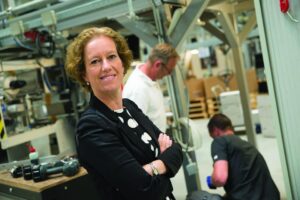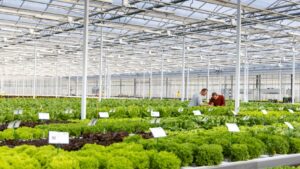Rijk Zwaan shares how the company stays agile, remains innovative and achieves strong growth: by focussing on recruitment and retention to ensure a steady stream of talented employees.
Rijk Zwaan is a worldwide active vegetable seed company, with a wide range of high-quality crops. It is a family-owned company with a turnover of €350 million, and around 2,600 employees in 30 countries, of which 1500 are located in Europe. Rijk Zwaan has a people-minded company culture, and encourages employee participation. Each year, the company invests approximately 30 per cent of its turnover in R&D, and applies a strategy for growth, which is realized autonomously, without acquisitions. On a yearly basis, around 150 new employees join the company, of which about half are Europeans.
Because of the company’s constant growth, there is a lot of attention on hiring the right talent. This is done in a number of ways, for example, new employees need to understand the company, so time is spent on employer branding. Via the website, interviews and other media, attention is focussed on the way the company works, and its values.
These items are known by many people in the seed sector because the company cooperates with others on various projects. This is a concrete and transparent way to demonstrate the company’s vision and how our people interact. Because of this, we regularly receive high-quality job applicants who know well what they want and why they want to work for us. Our own ‘careers’ website is also a powerful medium to share the values of our company and to communicate who it is we are looking for. Open vacancies are shared on this website, and because of our growth there are new vacancies on a weekly basis.

Recruiting
How we fill our vacancies depends on the target audience. If we are looking for someone who takes care of the crops, we usually place an ad via local media. General researchers are more inclined to move for a job, for those positions we advertise nationally. If we are looking for bioinformatic people, we employ international channels, as these applicants are more often than not open to live and work abroad.
The use of social media is usually very effective, and at the moment, we mainly use LinkedIn. We share new vacancies via social media, and we have noticed this works well in many countries. In an easy and accessible manner, we are able to reach potential candidates. On top of that, our employees share vacancies within their own networks.
The recruitment of people for the plant breeding sector differs depending on country and function. For example, the supply of breeders in France and Spain is quite good, whereas in Turkey, it can be quite hard to fill such positions. In Italy, it is difficult to find commercial people with a ‘green’ education, but if we were to hire for a management position, the supply is large. In general, we see more attention in the media for healthy food, world food security and strong innovation in biotechnology. This is drawing more students to plant breeding and potential candidates from related sectors. It should be mentioned, in general, filling international management positions remains challenging; meanwhile we have relative great demand for such functions.
‘Referral recruitment’ is also an important channel for finding talent. Current employees working in the market have a network of potential candidates and can assess well if certain individuals would fit with the company culture. In addition, employees are able to provide relevant information about interesting candidates. We encourage our employees to refer people for a function; however, this is usually from outside the seed sector. We do not intentionally and actively approach candidates from within the seed sector.
Obviously, we favour our own employees when filling a vacancy; the advantage being the chance of success is high. We have already been able to follow their performance, and can make a better judgement whether there is a good fit for the function.
In addition, it is interesting and motivating for employees to see management positions filled in this way—not only for their own personal development, but also for support. Thus, internal candidates are brought up to speed quicker and are productive in their new functions: they know the culture, have a strong network, and are familiar with the products and processes.
At ‘in-house’ days, we attract more young professionals, and through a process of rotation in different positions, these individuals gain broader experience and knowledge, and can therefore, in the future, fill various functions.
Candidate Characteristics
We are selective when hiring new colleagues. We look at personal characteristics, values and motivation more than most other companies do. Important values for our company are reliability, loyalty, entrepreneurship and team spirit. People who put their own aims first are usually not a good fit with our company. Besides this, we also select people based on their internal drive. If they do what they are good at, while enjoying themselves, it will reflect in their work. If someone has the required qualities but has different ambitions (for example, someone in information technology who would rather do something else), we advise that person to find a job that drives them.
During the job application procedure, at least two interviews take place, and the department head, human resources, or the board, are involved. In certain countries, we also carry out an assessment. Fortunately, employee turnover is very low. We do not like to even think about a turnover rate of 10 per cent, instead of the current 1.5 per cent. This would mean an additional 85 vacancies per year for the Netherlands. In addition, higher turnover of people would mean a tremendous loss of knowledge, and one would have to invest much more in the renewal of cooperation in various projects.
The feedback we receive from our new employees is they appreciate the fact that their new colleagues are willing to show them the ropes within the company. It helps that we are quite sure a newcomer is going to stay until the end of his or her career.
Retention
What is the reason people want to stay? They experience freedom and trust. They have a lot of room to be active as an entrepreneur within the company. Bringing forward new ideas, being proactive and showing initiative are very much appreciated. This trust begins at the start, where, after a thorough application procedure, we immediately offer a permanent contract. A current trend in society is to give more flexible work contracts, but that does not fit our company. Ninety-nine per cent of our contracts are permanent ones. We like to build our future with the same people. It is clear we can only offer this as a company if we are sure the company will continue for several more generations.
This policy is based on a clear vision, in which we respond to developments in the market and have a good strategy. We work with detailed multi-year plans. If we did not do this, we would not be able to guarantee work 20 years or more from now. Subsequently, you can only offer a permanent contract after a thorough selection process. Some people say this is the way we retain our employees, but this is nonsense. People can leave whenever they want. The retention happens because we offer a lot of freedom and trust within a flat organization where people can do the work that fits them. This is what people experience, and why they feel at home and stay with the company.
If we wish to stay innovative as a breeding sector, this can only be done if our employees are motivated to do it in the best possible way—to think and bring forward ideas. In innovative sectors, there must be an open, transparent and inspiring culture. People can develop themselves through working with new technologies or by changing work processes within their own jobs. Additionally, because of the strong growth, which is necessary to guarantee continuity, new functions are created on a regular basis. Therefore, people can develop themselves broadly and also in the direction of management positions. Around 60 per cent of these positions are now filled by internal candidates.
No less important is the fact that the company does not have the aim of making as much profit as possible in the short term. The board sincerely wants to offer the employees a pleasant and long-lasting job with good labour conditions. Profit is, of course, necessary to be able to continue to offer such a package, but is more a means to an end. This is reflected in the choices that are made, which are aimed at the long term and towards our people.
For instance, we do not work with assessment forms, as we do not wish to grade our employees. We focus more on the talents and strengths of our employees. People can fulfil functions in different ways, and all of those can be successful. Our broadly developed International Rijk Zwaan Academy, with training at all levels, helps us to stay abreast of all developments, and offers our people personal education. In addition to technical training we also offer commercial and skill programs, which are tailor-made by the IESE Business School. Developing international training programs strengthens international cooperation and company culture.
All these aspects ensure that an organization stays agile, remains innovative and achieves a strong growth. This also contributes to the recruitment of new staff, and at Rijk Zwaan we feel we have a different company culture than most other companies.
Editor’s Note: Emilie ten Bokkel Huinink is the human resources manager at Rijk Zwaan.












